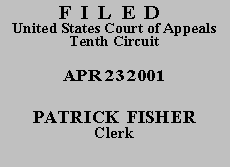

| UNITED STATES OF AMERICA,
Plaintiff-Appellee, v. DAVID RAY GADDIS, Defendant-Appellant. |
|
Defendant David Gaddis appeals the district court's denial of his motion to vacate, set aside, or correct sentence, brought pursuant to 28 U.S.C. § 2255. Because defendant has not made a substantial showing of the denial of a constitutional right, we deny his application for a certificate of appealability and dismiss his appeal.
After a jury trial, defendant was convicted of conspiracy, wire fraud, engaging in monetary transactions derived from illegal activities, and money laundering, for which he received concurrent forty-six month sentences and a restitution order in the amount of $309,000. We affirmed his conviction in United States v. Gaddis, No. 98-6273, 1999 WL 824416 (10th Cir. Oct. 15, 1999) (unpublished disposition).
In February 2000, defendant filed this § 2255 motion, alleging his trial counsel was deficient in failing to object to each of the counts in the indictment. In March 2000, defendant filed an addendum to his motion, alleging that his attorney was ineffective in failing to investigate the role played by former United States Attorney Daniel Webb in bringing the charges against defendant. The district court denied the § 2255 motion on the ground that its allegations were unsubstantiated, conclusory, speculative, and "far-fetched." R. doc. 121, at 3. Defendant appeals the denial of his § 2255 motion.
Before we may address the merits of this appeal, defendant must obtain a certificate of appealability by making a substantial showing of the denial of a constitutional right. 28 U.S.C. § 2253(c)(2). To meet this burden, he must show that "reasonable jurists would find the district court's assessment of the constitutional claims debatable or wrong." Slack v. McDaniel, 120 S. Ct. 1595, 1604 (2000).
After reviewing defendant's brief and the record, we conclude that he has not met his burden. Defendant's argument regarding the possibility that former U.S. attorney Webb somehow influenced the prosecution against him is mere speculation, with no evidentiary support whatsoever. Under these circumstances, the district court was not required to hold a hearing, to permit discovery, or to grant the § 2255 motion. See Hatch v. Oklahoma, 58 F.3d 1447, 1471 (10th Cir. 1995) (evidentiary hearing); Wallace v. Ward, 191 F.3d 1235, 1245 (10th Cir. 1999) (discovery), cert. denied, 530 U.S. 1216 (2000); Smallwood v. Gibson, 191 F.3d 1257, 1280 n.14 (10th Cir. 1999) (habeas relief), cert. denied, 121 S. Ct. 88 (2000). Further, the Supreme Court's decision in Apprendi v. New Jersey, 530 U.S. 466, 120 S. Ct. 2348, 2362-63 (2000), does not apply.
Defendant's motion to proceed on appeal without prepayment of costs and fees is granted, his application for a certificate of appealability is denied, and the appeal is dismissed.
Entered for the Court
Circuit Judge
*. This order and judgment is not binding precedent, except under the doctrines of law of the case, res judicata, and collateral estoppel. The court generally disfavors the citation of orders and judgments; nevertheless, an order and judgment may be cited under the terms and conditions of 10th Cir. R. 36.3.